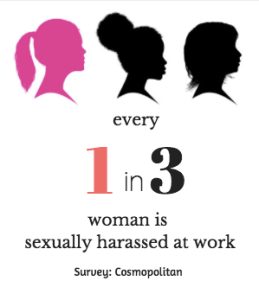In December 2017, following sexual harassment scandals in Hollywood and Westminster, a report into the sexual harassment complaints process in the Australian Federal Parliament concluded that procedures for staffers in this workplace are “incomprehensibly and woefully inadequate.”
The parliamentary policy, controlled by the Department of Finance…does not specifically address sexual harassment as defined by the Sex Discrimination Act (which clearly defines sexual harassment as unwelcome contact of a sexual nature), give examples of behaviour that would constitute unlawful sexual harassment, and, perhaps most egregiously, it does not clearly spell out an employee’s options for pursuing a sexual harassment claim and relevant time limits. The appropriate legal avenue is to make an individual complaint to the Australian Human Rights Commission, but a six-month time limit applies….
Furthermore:
“Where a complaint is substantiated, Finance has no capacity to take disciplinary action against either a Senator or Member or a MOP (S) Act employee.”
At the time of writing, Prime Minister Malcolm Turnbull and Opposition Leader Bill Shorten have remained woefully and incomprehensibly silent about the sexual slurs against Senator Sarah Hanson-Young made by Senator David Leyonhjelm, both in the Senate and later on the Sky News program Outsiders, a whine-fest of woeful and incomprehensible proportions with entirely comprehensible audience numbers of a mere few thousand, hosted by two of the most sadly inadequate men in media, Rowan Dean and Ross Cameron. Cameron is also a former Liberal politician, given shelter by the Sky News network retirement home for failed conservatives.
Sky News, Dean and Cameron have since apologised to Hanson-Young who has instigated legal action. Leyonhjelm, libertarian and defender of free speech but only when it suits him, has not.
Turnbull and Shorten are the leaders of the parliamentary workplace. Leyonhjelm’s verbal sexual abuse of Hanson-Young occurred in that workplace, as well as later in the media. The Senator attempted to use Hanson-Young’s assumed sexual life as a weapon against her. In other words he slut-shamed her, in the Senate and later the media, in the time-honoured manner of misogynistic old men who have never resolved their desire for women with their simultaneous hatred of us.
It was one of the more sickening episodes to come out of a parliament that daily emits a multitude of sickening events.
The silence from Turnbull and Shorten is deafening. Indeed, it is a betrayal of every woman in that workplace, as well as those of us outside of it. No woman is required to suffer sexual slurs when she goes to her job.
Sexual slurs are at the beginning of a continuum that ends with our rape and our murder. There is no workplace occasion, absolutely none, in which it is acceptable to comment on a woman’s sexual life and choices.
Turnbull and Shorten, quick to don the White Ribbon, quick to avail themselves of the photo opportunity and publicity surrounding the ghastly murder of Melbourne comedian Eurydice Dixon, are complicity silent when a female senator’s sexual life is used in the Senate as a weapon.
Lack of respect, Turnbull famously trumpeted, is where violence against women begins. If you respect women, he claims, you will not harass and abuse us. Lack of respect is the beginning of all violence against us, according to the Prime Minister who said on September 25, 2015:
Let me say this to you: disrespecting women does not always result in violence against women. But all violence against women begins with disrespecting women,”
Turnbull’s silence on the sexual harassment of Hanson Young in the Senate indicates utter lack of respect for women, if not contempt. Shorten’s silence indicates the same. The silence of both leaders goes a long way to explaining why the Australian Parliament has some of the most inadequate workplace sexual harassment policies in the western world. Because they don’t give a damn about women. They don’t give a damn.














































Recent Comments